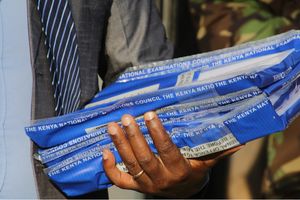Embarambamba: My gospel songs are not vulgar, people misinterpret them

Musician Embarambamba dances with James Ongwae, then Kisii governor, in Kisii town on July 13, 2016.
His risky and wild dance moves, running into crowds of revellers, mounting the back of cows or anything near him during his performances, his brightly coloured and clashing suits, and the language in his songs, have earned him fame creating a popular ‘brand’ for gospel musician Embarambamba.
The artiste, real name Christopher Mosioma, often dons mismatched suits with bright colours and sometimes with intriguing patterns, often courting controversy with his antics, including rolling in mud and jumping on people and trees, exposing himself and others to the risk of getting injured.
And despite some citizens and leaders criticising him for going overboard with his dance styles and the language in his songs, he is not stopping any time soon, he says.
Embarambamba argues, instead, that his bizarre dances and the lyrics are meant to appeal to more fans. He defends himself saying he is still on a gospel mission to ensure more souls get to heaven.
Despite his arguments, his latest songs are now raising eyebrows with critics arguing that they are laced with suggestive undertones that do not communicate heavenly or Christian messages.
Amongst Embarambamba's latest songs are Imesimama, Iny'igwete ndine, Mama nariegwa, Yasoire bono somora, Napenda mbele sipendi nyuma, all of which have some level of vulgarity, at least in the Kenyan context.
In his songs done in Kiswahili and Ekegusii, Embarambamba uses lewd language to express matters love, which he sometimes purports to connect with Christianity.
After repeating the obscene stanzas several times, he later introduces the gospel aspect of the song.
“I have seen people criticising me, saying my songs are shameful and immoral. They say my songs are not gospel and that they go against the tenets of Christianity. You know people do not understand songs,” he says.
“When people hear the words naskia nipande (I feel like climbing), they think it's that ‘climbing’ used in making love. They do not hear ‘I feel like boarding Jesus' vehicle’. When they hear imeamka imesimama (it’s up and standing), they think that thing (male anatomy) is indeed up. They can’t tell that it is the gospel that is ‘up and standing’,” he argues.
In the Kenyan slang context, the phrases he uses in the songs could connote sex-related activities, but he argues that he uses the phrases in the gospel context.
The artiste who hails from Keroka in Nyamira County reveals that people are accusing him of delaying the gospel part of his songs.
He adds that his lyrics have caused problems because of “people’s way of interpretation,” which he argues is misguided.
He clarifies that his latest song about his mother, where he says “mama yangu amekuliwa (my mother has been chewed)," should not be interpreted using the slang understanding which would have a sexual connotation, but should be interpreted in context—he says phrase is about how the mother was conned by rogue saccos and clients.
“Those saccos squandered her money. The boda boda riders she sold bread to declined to pay her, while construction workers refused to pay for the githeri she supplied them. She was even attacked by ants. Hunger ate her. When people hear my ‘mum was eaten’, they say that is bad manners and wonder who ate her. They think that she slept with someone,” said Embarambamba.
“You know nowadays; artistes must have unique ways of attracting audiences. People must see something different in you. You must know how to attract people to know your songs. You need to start with a message that is different from other musicians. Then you release the rest of the message later. That is why I am different,” he noted.
“You can for example start by saying oihh, aihhh...amenidunga amenidunga (he has injected me, he has injected me), then later say ‘Jesus has injected me with a jab’. If you start by singing that ‘Injili imesimama (the Gospel is strong)’, no one will watch or listen. But when you start with ‘imeamka, mama nimeskia joto joto (it is standing strong, mother I am feeling warm)’, people will be attracted.”
***
Do you have feedback on this article? Please e-mail: [email protected]




